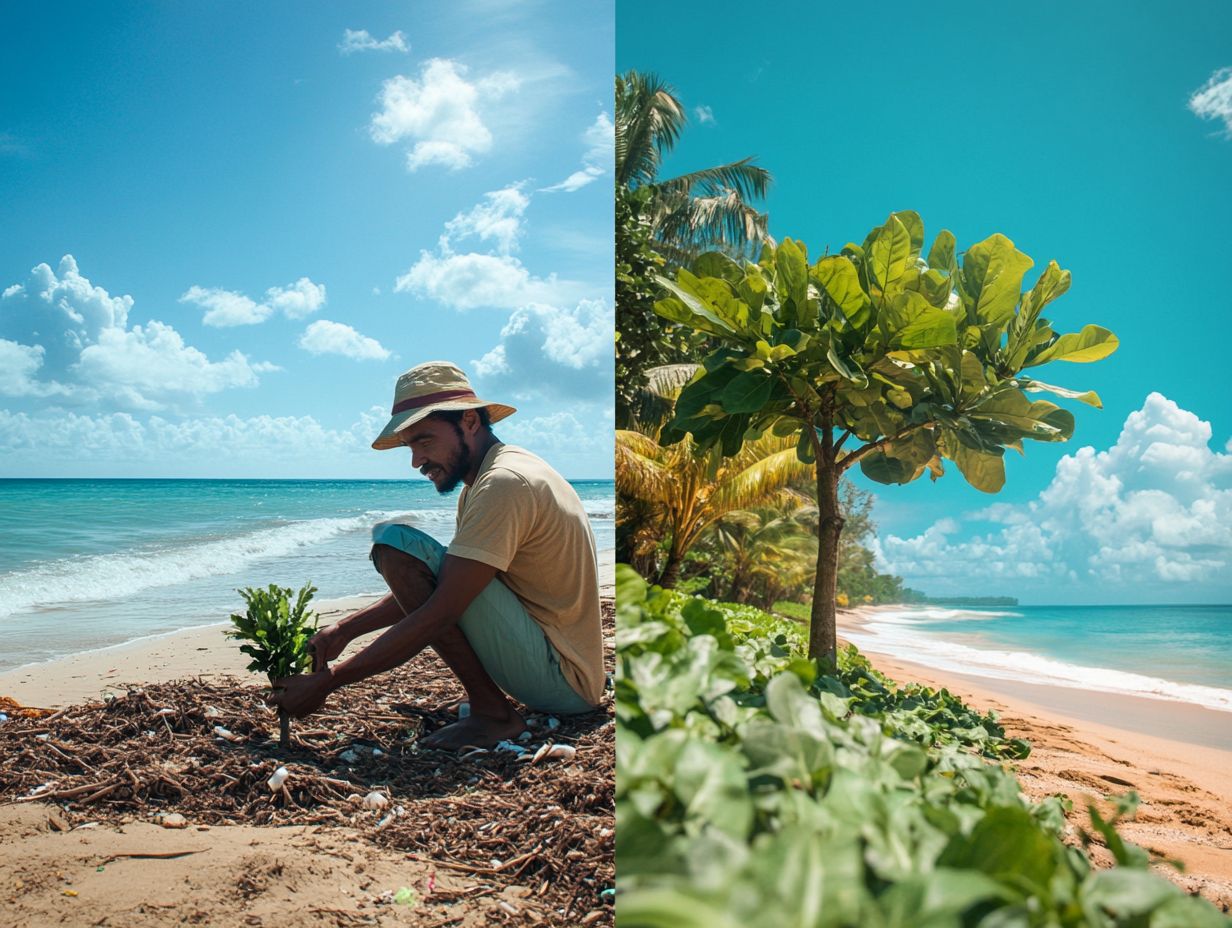Traveling Responsibly: Myths vs. Facts
Traveling offers an incredible opportunity to immerse yourself in new cultures and breathtaking landscapes. However, misconceptions about responsible travel can obscure your intentions.
This article delves into prevalent myths while illuminating the realities of responsible travel. Explore the significant environmental and social benefits that arise from making ethical choices during your adventures.
You’ll also find practical tips designed to help you travel sustainably while addressing the challenges you may encounter along the way. Embrace the chance to promote positive change through your mindful exploration.
Contents
- Key Takeaways:
- Myths and Facts About Responsible Traveling
- Benefits of Responsible Traveling
- How to Be a Responsible Traveler
- Challenges and Solutions for Responsible Traveling
- Frequently Asked Questions
- What are some common myths about traveling responsibly?
- Is responsible travel only for experienced travelers?
- Do I have to sacrifice comfort and convenience to travel responsibly?
- What is the difference between responsible travel and sustainable travel?
- Are all forms of voluntourism considered responsible travel?
- Do I need to avoid popular tourist destinations to travel responsibly?
Key Takeaways:

- Responsible traveling is not just about being eco-friendly; it also involves respecting local cultures and supporting the local economy.
- Choosing responsible travel options helps reduce your carbon footprint (the amount of carbon dioxide emissions produced by an individual or organization) and makes a positive impact on the environment and local communities.
- Being a responsible traveler may require some extra effort, but the rewards of creating a more sustainable and responsible travel industry are worth it.
Myths and Facts About Responsible Traveling
Responsible traveling is often clouded by a host of myths that can obscure the authentic essence of sustainable travel and its profound benefits for local communities and the environment. You might think that eco-friendly options are exclusively for budget-conscious travelers, but the truth is that responsible tourism can seamlessly blend with luxury experiences that honor cultural heritage and support community development.
Debunking these travel myths is essential to cultivating a deeper understanding of how your travel choices affect the planet and its people. For more insight, check out common myths about eco-friendly travel. This understanding can inspire more travelers to embrace conscious decisions that truly make a difference.
Common Misconceptions and Truths
Many misconceptions about responsible travel suggest that it s too expensive for most people or overly inconvenient, overlooking the diverse range of eco-tourism options available to suit every budget and preference.
You might assume that embarking on an eco-friendly journey requires sacrificing comfort or convenience, but that couldn t be further from the truth. In reality, sustainable travel can elevate your experience, inviting you to explore lesser-known destinations where authentic interactions with local communities flourish.
By choosing locally owned accommodations and dining establishments, you not only support regional economies but also open yourself up to unique culinary experiences and rich cultural immersion. Embracing responsible practices allows you to engage in enriching activities that deepen your appreciation for cultural heritage while actively contributing to the preservation of the environments you explore.
Benefits of Responsible Traveling
Embracing responsible travel not only elevates your personal experiences but also brings significant benefits to local communities and the environment. By making conscious choices, you play a vital role in environmental conservation and community development, ensuring a sustainable future for tourism.
Supporting eco-friendly accommodations and local businesses allows you to significantly reduce your carbon footprint while promoting cultural heritage, creating a collective impact that extends beyond your individual journey.
Recognizing these benefits is crucial for any travel enthusiast who aspires to journey in a sustainable and responsible manner. Join the movement for responsible travel!
Start planning your eco-friendly trip today!
Environmental and Social Impact

The environmental and social impacts of responsible travel are profound. Conscious choices can greatly reduce the negative effects of traditional tourism on local communities and ecosystems.
Irresponsible tourism increases carbon emissions from air travel and local transport. This worsens climate change and air pollution.
Unchecked tourist activities can lead to habitat destruction. This jeopardizes biodiversity and disrupts local wildlife.
Sustainable initiatives focus on eco-friendly practices. They prioritize environmental protection, such as using renewable energy and respecting natural habitats.
Supporting local businesses and engaging in community-based tourism reduces your carbon footprint. It also stimulates economic growth and cultural preservation.
How to Be a Responsible Traveler
Being a responsible traveler means embracing sustainable practices. These not only lessen your environmental impact but also enrich your travel experience through genuine connections with local communities.
Choose eco-friendly accommodations that emphasize conservation. Engage local guides to dive deep into cultural heritage.
Your travel choices influence carbon footprints and community welfare. You play a significant role in advancing responsible tourism initiatives.
Tips for Ethical and Sustainable Traveling
To travel ethically, embrace practices that safeguard the environment. For example, using reusable containers can cut down on single-use plastics.
Packing light greatly reduces your carbon footprint. It also encourages you to think critically about what you truly need.
Research eco-friendly accommodations that prioritize solar energy and water conservation. Supporting local businesses enriches your experience while uplifting the community.
Choose a reusable water bottle and eco-conscious tours. Brands like Patagonia and EcoBags inspire travelers to tread lightly and travel wisely.
Challenges and Solutions for Responsible Traveling
Responsible travel can be challenging, but it’s worth it! Innovative solutions can guide us toward sustainable tourism practices.
By harnessing insights from behavioral science, you can explore travel options that align with responsible choices. This enhances your experience and prioritizes environmental conservation.
Overcoming Obstacles and Promoting Positive Change

Overcoming the obstacles to responsible travel requires your active participation, along with that of communities and the tourism industry. Together, we can foster positive change through green initiatives and sustainable practices that benefit everyone.
By encouraging collaboration among travelers, local residents, and various organizations, you can be a driving force for change. This collective approach enriches your travel experiences and ensures that local cultures and ecosystems thrive.
Consider initiatives like community-led eco-tours or the establishment of conservation areas. These efforts showcase how meaningful partnerships can enhance both tourism and environmental stewardship.
Engaging directly with local artisans allows you to appreciate authentic cultural heritage while generating economic benefits for the community.
These initiatives highlight a vision of responsible tourism where all parties work together towards sustainable development.
Frequently Asked Questions
What are some common myths about traveling responsibly?
Some common myths include the belief that eco-tourism is always beneficial, that local cultures should be preserved without outside influence, and that responsible travel is only for experienced travelers.
Is responsible travel only for experienced travelers?
No, responsible travel is for everyone. Every traveler should be aware of their impact on the environment, local communities, and cultures, regardless of experience.
Do I have to sacrifice comfort and convenience to travel responsibly?

No, responsible travel doesn t mean sacrificing comfort and convenience. You can enjoy a comfortable trip while traveling responsibly by choosing eco-friendly accommodations and supporting local businesses.
What is the difference between responsible travel and sustainable travel?
Responsible travel focuses on being mindful of your impact on the environment and local communities, while sustainable travel goes further by actively working to preserve these elements for future generations. This means making conscious choices to minimize your carbon footprint and support eco-friendly initiatives.
Are all forms of voluntourism considered responsible travel?
No, not all voluntourism is responsible. It s vital to research and choose reputable organizations that positively impact local communities while respecting their cultural heritage.
Do I need to avoid popular tourist destinations to travel responsibly?
Avoiding popular tourist spots isn’t necessary. However, it’s important to be mindful of your visit’s impact and support local businesses. Opting for sustainable accommodations and engaging with local guides can enhance your travel experience.
Ready to make a difference? Explore eco-tours and local initiatives to support responsible travel!






